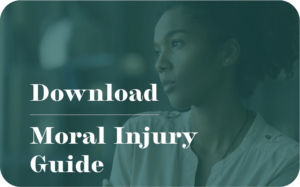Videos
In the context of public safety, moral injury describes the psychological, emotional, and/or spiritual harm that one might experience as a result of events or situations that transgress one’s deeply held morals, ethics, or values. First responders and other public safety personnel (PSP) are routinely called upon to make rapid decisions during complex crisis situations. These situations often involve multiple conflicting responsibilities, uncertainty, and ambiguity, which can have profound moral implications. Potentially morally injurious events (PMIE) can take various forms, including exposure to actions, inactions, or events that violate a person’s beliefs of right and wrong, betrayal by a trusted person, leadership shortcomings, or organizational failures.
A growing body of research highlights the ways that frequent exposure to potentially psychologically traumatic events (PPTE) can negatively impact the mental health and wellbeing of PSP, and contribute to the development of operational, or posttraumatic stress injuries (PTSI). Similarly, exposure to one or more PMIE can result in moral injury that may be associated with mental health challenges.
This panel discussion will discuss the profound impacts of moral injury on PSP, as well as emergent guidelines for supporting and treating individuals negatively impacted by the moral weight of their service.
April 18, 2024.
Presented by:
Dr. Suzette Brémault-Phillips, PhD, MA, BMR, BSc
Professor, Faculty of Rehabilitation Medicine, University of Alberta
Director, Heros in Mind, Advocacy and Research Consortium (HiMARC)
Dr. R. Nicholas Carleton, Ph.D., R.D. Psych., FCAHS, MCRSCP
Professor of Psychology, Department of Psychology, University of Regina
ScientificDirector, Canadian Institute for Public Safety Research and Treatment (CIPSRT)
Dr. David C. Malloy, PhD
President, King’s University College at Western University
Dr. Liana Lentz, PhD
King’s University
Dr. Margaret McKinnon, PhD, CPsych
Homewood Chair in Mental Health and Trauma
Professor and Associate Chair, Research, Department of Psychiatry and Behavioural Neurosciences, McMaster University
Research Lead, Mental Health and Addictions, St Joseph’s Healthcare Hamilton
Dr. Lorraine Smith-MacDonald, MDiv, MA, PhD
Co-chair, Department of Psychotherapy and Spirituality, St. Stephen’s College, University of Alberta
Moderated by:
Dr. Katy Kamkar, PhD, CPsych
Clinical Psychologist
Associate Professor, Department of Psychiatry, Temerty Faculty of Medicine,
University of Toronto
